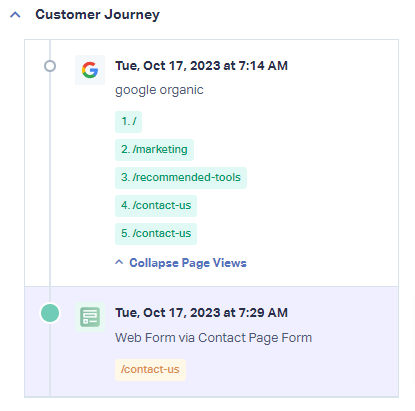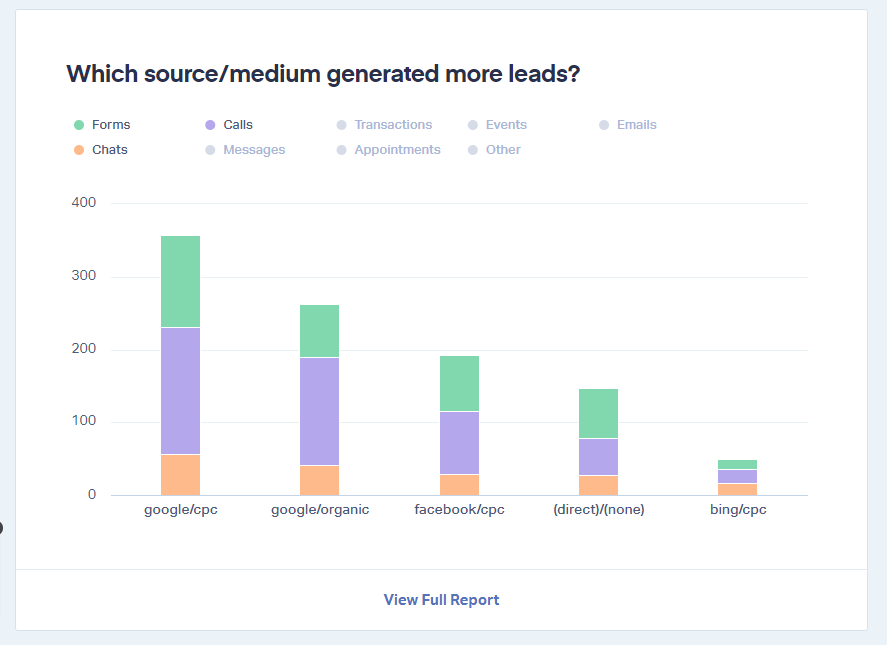How to Simplify Cross Channel Marketing Attribution to Accurately Track Leads
In the interconnected world of digital marketing, understanding and managing cross-channel marketing attribution can be the linchpin for a successful marketing strategy. For small to medium-sized businesses especially, recognizing the paths customers take through various channels and accurately attributing sales to the correct campaigns is both essential and challenging. Misspent marketing dollars can be the difference between a barely surviving business and a thriving enterprise.
In this article, we will explore what cross-channel marketing attribution is, why it's difficult, and how it can be simplified using innovative tools that are not marketing channel specific.
Table of Contents
What is Cross Channel Marketing Attribution (Lead Attribution)?
Cross-channel marketing attribution, also known as lead attribution, is the process of identifying which marketing channels and efforts contribute to achieving specific business goals, primarily conversions and sales. This method involves tracking the customer journey across multiple touchpoints and determining which interactions led them to take a desired action.
Some of the most commonly desired actions (conversions) include filling out a contact form, starting an online chat with a sales rep, calling your office, scheduling a meeting, or making a purchase.
In essence, effective lead attribution provides a clear picture of how each channel (such as email marketing, social media, paid Google ads, and SEO) impacts the buyer’s journey. Accurate lead attribution allows marketers to allocate resources more efficiently to high-performing marketing campaigns and tailor strategies that resonate with their target audience, enhancing both customer acquisition and retention.
Why Cross Channel Lead Attribution Is So Difficult

Keep in mind that today’s consumers may engage with multiple marketing channels in varied orders before deciding to make a purchase. As a result, two core challenges of cross-channel lead attribution are 1) the complexity of modern customer journeys and 2) the inherent limitations of channel-specific tracking systems.
The following are a few reasons why cross-channel marketing attribution can be so intricate.
Multiple Touchpoints
Consumers might interact with a brand in numerous ways across different platforms before converting. Each of these interactions could potentially influence their decision, making it hard to pinpoint which channels are most effective.
Fragmented Data
Each marketing channel typically uses its own tracking and analytics systems. For example, Facebook Pixel tracks Facebook conversions, LinkedIn’s tracking system tracks LinkedIn conversions, etc. Aggregating this data into a single, coherent framework for analysis often results in significant logistical challenges and misappropriated conversion details.
Ever-Changing Technologies
For example, if you once used Acuity Scheduling for booking meetings, but then you shift to Calendly’s scheduling tool to streamline your operations, you must re-configure your tracking mechanisms. Additionally, you must make sure the new scheduling tool integrates with each of your marketing channels to confirm it can track conversions successfully. Ultimately, frequent changing of a company’s software exacerbates tracking accuracy.
Mixed Attribution Models
There are several models for attribution (such as last-click, first-click, linear, data-driven, and time decay), each with its own strengths and weaknesses. Choosing the right model can significantly affect the interpretation of data and marketing strategy decisions. However, many marketing-specific platforms only offer one attribution model which may not line up with your company’s needs or other channel objectives.
Can Google Analytics Solve My Marketing Attribution Problem?
Many companies turn to Google Analytics to solve the issue of tracking multiple systems in one place. While Google Analytics can be a great tool to track overall traffic to your website, popular pages, and overall trends, it can be difficult to use for cross channel marketing attribution for the following reasons:
- Limited Offline Tracking – Google Analytics is primarily designed to capture online interactions. Their functionality is weaker when it comes to tracking offline interactions like phone calls, print ads, etc.
- Fragmentation Across Platforms – While Google Analytics is excellent at tracking campaigns via Google products like Google Ads (Search, Display Network, etc.) and YouTube, its tracking features breakdown when you start integrating more systems that are not within the Google family.
- Technical Know-How – Google Analytics can be configured to track quite a few types of conversions if you have highly technical individuals on staff who both have a background in 1) web development and 2) analytics/data science. Naturally, this is a large barrier for entry with small businesses.
- Limited Support – Google Analytics is a free tracking platform, which is amazing. However, it also means Google does not have an incentive or funding to provide robust technical support for Google Analytics. Thus, its correct usage relies on your own abilities to interpret their systems or hiring a third-party marketing agency who may or may not be experts in Google Analytics.
- User Feedback – Since Google Analytics is a free product by Google, their willingness to prioritize user feedback is very limited. Perform a quick search on “Google Analytics 4 issues” (Google’s latest iteration of their Analytics platform) within a search engine or marketing forums/communities. You will quickly see so much animosity regarding the forced switch from Universal Analytics to Google Analytics 4 (GA4) which includes loss of data portability, missing features, and more.
While I certainly wish Google Analytics was a practical cross channel marketing attribution solution, it frankly isn’t ideal for businesses without deep technical teams or for businesses running and testing multiple marketing channels at once.
How to Simplify Cross Channel Marketing Attribution
To tackle the challenges of cross-channel marketing attribution effectively, leveraging a platform-agnostic tool is the ideal solution. A platform agnostic tool is built to track all marketing channels from one, independent system. As a result, you can track various social media campaigns, online ads campaigns (e.g. Google, Bing, etc.), SEO, offline mailers, and more all from one centralized system.
We have researched and tested a few of the best-performing conversion tracking platforms over the years with varying levels of success. The platform we ultimately chose and use every day at Igniting Business both for our own tracking and our clients is called WhatConverts. We researched other tools including CallRail and CallTrackingMetrics, which we have heard other agencies also use. However, we ultimately decided to use and recommend WhatConverts after six months of initial testing primarily because of its ease-of-use, integrations with over 1,000 different platforms, and ability to track so many different types of conversions.
WhatConverts is not the cheapest, but it is well worth it.
How WhatConverts Delivers Cross Channel Marketing Attribution with Ease
WhatConverts offers a unified solution for tracking and analyzing the performance of various marketing efforts across all channels. Here is how we use it to simplify conversion attribution process at Igniting Business:
- Comprehensive Tracking: WhatConverts captures and consolidates data from all customer interactions, regardless of the channel. This includes digital footprints like website visits, form submissions, chats, sign-ups, e-commerce transactions, as well as offline engagements such as phone calls.
- Granular Lead Details: The platform provides detailed insights into each lead, including the originating channel, the specific campaign (even including the specific ads and keywords used in select ads platforms), and subsequent actions taken by the consumer. This granularity helps in understanding the effectiveness of different messages and channels. Additionally, the system’s Elite plan provides a full Customer Journey map to see each step along their path to conversion.

- Real-Time Analytics and Customizable Reporting: Immediate access to data through real-time analytics allows marketers to adapt their strategies swiftly and efficiently. Adjustments can be made on the fly to enhance performance and ROI based on the reported data.
- User-Friendly Interface: WhatConverts is designed with usability in mind, making it accessible for marketers who may not have deep technical expertise. Its intuitive dashboards and reports make complex data easy to interpret. Additionally, the setup and onboarding process is by far one of the most streamlined I’ve personally ever used. We had phone call tracking and form submission tracking up and running within less than 30 minutes.
- Flexible Integrations: The ability to integrate seamlessly with other tools and platforms ensures that WhatConverts can fit into any marketing tech stack, providing a holistic view of marketing efforts and their outcomes. WhatConverts integrates with over 1,000 different systems and can also extend its functionality with Zapier.
Next Steps for Solving Your Marketing Attribution Problems
For businesses aiming to navigate the complexities of today’s marketing landscape, understanding the role of each channel in driving customer decisions is crucial. Cross-channel marketing attribution does not have to be a daunting task. With tools like WhatConverts, businesses can gain the insights needed to optimize their marketing efforts, allocate budgets effectively, and drive more meaningful engagements with their audience.
As a marketer and business leader, I recommend embracing these technologies to not just survive, but thrive in the competitive digital marketplace. WhatConverts offers a practical pathway to clearer insights and smarter marketing decisions, helping businesses of all sizes to harness the power of their marketing data effectively.
In my opinion, your next step is to simply give WhatConverts a try. If you do sign up for a package with them, I recommend either the Pro or Elite packages, both of which come with complimentary Account Setup Service where the support team guides you through getting started.
If you have a question about our experience with WhatConverts, drop us a line via our Contact page. Additionally, if you want more free insights based on our firsthand experience marketing hundreds of small businesses across the US, sign up for our monthly newsletter.
At no additional cost to you, we may receive a commission if you click on some of the links on this website and make a purchase.
About the author
Ben Seidel is the CEO and Founder of Igniting Business. Ben has been serving hundreds of small businesses with web design and SEO services for over 15 years and covering digital marketing related topics since 2012.
Over the years, Ben has been recognized on a local and national level, including entrepreneurship awards from both the NFIB and NASE and being featured in publications such as CNBC Universal, Yahoo News, Intuit Small Business, CIO.com, Mizzou Magazine, and Fox Business.
